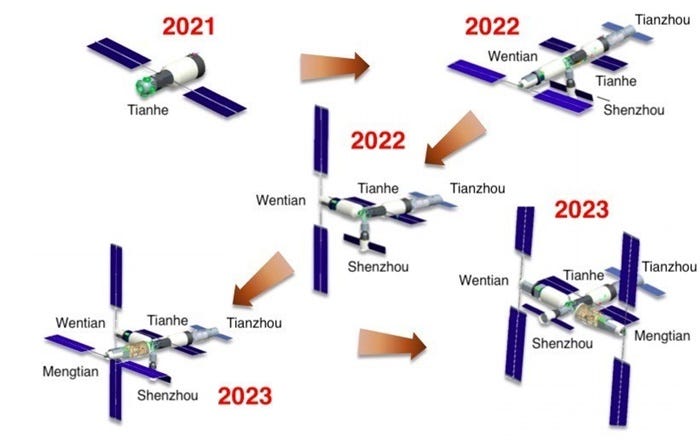Welcome to Taikonautica, your regular dose of the Chinese space industry. If you haven’t subscribed yet, sign up here.
And if you like what you’ve been reading, please forward to your friends!
Housekeeping: I will be updating the Taikonautica Chronicle, which contains the items from the news roundup more regularly than I send out newsletters and I’ll put the date it was last updated at the top of the page.
Also, I will end up adding more news items to the Chronicle than fit into the news roundup section so it should be a useful resource for your own research.
This week: What are the prospects for Chinese space tourism?
Chinese Space Tourism
Source: Wikimedia
Space tourism is having a bit of a moment. SpaceX recently announced the first civilian crew to the ISS, Inspiration4, which will be led by the founder of Shift4 Payments and launched in late 2021 (there was even a Superbowl commercial).
Apparently Inspiration4 will edge out AX-1, Axiom Space’s civilian crew mission, which was previously reported as the first completely civilian crew to be going to the ISS.
American company Space Adventures, which contracts rides through Russian state-owned space contractor Roscosmos, is also planning on getting back in the action. Their last private space tourist aboard the ISS was way back in 2009, but with the end of the Space Shuttle program the US government bought up all the available Soyuz slots.
Now with the extra capacity that US private launch companies have brought online, Roscosmos has more seats for private passengers and is planning on sending up two private customers to the ISS in 2023.
All of this got me thinking — what is the Chinese Axiom Space or Virgin Galactic?
To my mind one of the most important open questions for the future of Chinese space tourism is: will the Chinese government let the Chinese space station be used for commercial purposes?
This year is scheduled to mark the beginning of the construction of the Chinese space station.
Source: qianzhan.com
A truly farsighted Chinese government would use the station as a springboard for Chinese private industry in space, in addition to scientific research and national prestige.
One of the benefits of modular space stations is, well, they’re modular. Axiom Space is planning on jumpstarting its own private space station by beginning as a module attached to the ISS and then outliving the ISS when it reaches the end of its life.
Source: Axiom Space
Were a company like Axiom Space to try to jump straight into constructing a private space station, the initial investment required would be prohibitive.
Being able to use the resources of the ISS allows a company like Axiom to attain cashflow early, first by contracting trips to the ISS through SpaceX and then by attaching a module to the ISS and renting it out, giving Axiom a fighting chance at owning the first fully private space station.
Will China allow anything similar on its space station? Although China has been encouraging private involvement in the space sector since 2014, the Chinese state is also notoriously reticent about allowing even basic transparency, typically not announcing launches in advance, for example.
Therefore, my initial assumption is that we won’t see a commercial module on the Chinese space station anytime soon.
While I remain skeptical, however, there have been some optimistic signs. As far as I can tell, the Chinese government has not said anything about allowing a commercial module to be added or renting any of the station out, but it has suggested that space tourists might one day be allowed on on the station.
Also, once it’s built, China could always have a change of heart, like NASA has had in recent years regarding ISS.
Recent Official Statements on Space Tourism
In 2004, Yuan Jiajun (袁家军), then the president of the China Academy of Space Technology (a subsidiary of state-owned CASC) and current party secretary of Zhejiang, said that within 20 years China would realize space tourism (link in Chinese).
On October 30, 2011, Yang Liwei (杨利伟), China’s first person in space and then the deputy director of the China Manned Space Engineering Office, said that space tourists would one day visit the Chinese space station (link in Chinese).
Zhang Yulin (张育林), then the deputy commander-in-chief of the China Manned Space Engineering Office, said in 2016 that the Chinese space station would one day take space tourists (link in Chinese).
Wu Ji (吴季), vice chair of the Chinese Society of Space Research and a member of the CPPCC, believing that the Chinese space sector is too reliant on the government, submitted his "Proposal on Encouraging and Promoting the Development of Space Tourism" at last year’s two sessions (link in Chinese)
Hao Chun (郝淳), director of the China Manned Space Engineering Office, speaking at the 6th China (International) Commercial Aerospace Forum in Wuhan on October 19, 2020 (link in Chinese), said that “the completion of the space station will provide a broader development space for commercial aerospace” and “commercial operations can also provide a useful supplement to the ongoing operation of the space station.”
The Graveyard of Past Attempts
As in the west, the allure of space tourism has attracted many entrants, but so far no real success stories.
As of 2005, Space Adventures (太空探险公司) was planning to sell tickets to space through Hong Kong Space Tourism Co., Ltd. (香港太空旅游有限公司) (link in Chinese), although to date no private Chinese citizen has flown via Space Adventures (again, blame the US for cancelling the shuttle program and hogging Soyuz).
In 2006 it was reported that Hurun had gotten exclusive rights to sell Virgin Galactic (维珍银河) tours to Chinese customers (link in Chinese). Virgin Galactic has still not yet flown a paying customer of any nationality.
As of 2014, DEXO travel (探索旅行 ) had a contract to sell suborbital flights aboard spaceplanes belonging to XCOR Aerospace (XCOR宇航) (link in Chinese). XCOR went out of business in 2017, and presumably Chinese ticket holders were among the couple hundred people whose money was never refunded.
ChinaRocket, a CASC subsidiary, has suggested that it will eventually get involved in suborbital space tourism, but nothing concrete has materialized (link in Chinese).
Several of China’s private launch companies, including iSpace, Space Transportation, and LandSpace, have made noises about space planes, but to my knowledge they are all primarily focused on rockets at the moment. The China Aerospace Blog has a good overview of current Chinese spaceplane projects if you want to take a look.
News Roundup
Official News
February 12: China’s space program featured in China’s annual new year’s tv gala (link in Chinese)
February 11: The Russian government instructed Roscosmos to proceed with signing an MOU with China on the construction of a Moon base (link in Russian)
February 10: Tianwen 1 reached Mars orbit
February 4: Researchers at Tianjin University developed a robot arm for removing space debris
January 23: Chen Hengli (陈亨利) submitted a proposal for the Shanghai government to prioritize satellite internet at the Shanghai CPPCC (link in Chinese)
Commercial News
February 9: The European Space Policy Institute released a new report on newspace in Asia
February 7: State-owned China Satcom (中国卫通) deorbited communications satellite Zhongxing 9A when it ran out of fuel (link in Chinese)
January 27: PIESAT (航天宏图) announced that it expects a net profit of 118 million to 128 million yuan from 2020 (link in Chinese)
Tests
February 5: OneSpace (零壹空间) successfully conducted a test launch of its suborbital rocket Chongqing Liangjiang Star
approx. February 3: LandSpace (蓝箭航天) finished assembly of the first stage engine of its liquid oxygen-methane Zhuque 2 rocket
Investments
February 3: Haige Communications (海格通信) announced that it intends to spend CN¥49.5 million ($7.66 million) to set up an investment fund to focus on “wireless communications, Beidou navigation, aerospace, software and information services” (link in Chinese)
approx. February 3: Private satellite company Commsat (九天微星) received “hundreds of millions of yuan” from the China Internet Investment Fund (CIIF) for R&D
January 27: LEO Group (利欧), along with others, announced it was setting up a CN¥260 million ($40.26 million) fund called Hangzhou Jinyan Hangtian Equity Investment Partnership (杭州金研航添股权投资合伙企业) to invest in commercial aerospace (link in Chinese)
Until next time
My name is Cory Fitz and I write the Taikonautica newsletter. To make you smarter about China’s rapidly evolving space industry, Taikonautica brings you translations of Chinese-language articles, as well as a roundup of links and news.
If you have any questions, comments, or corrections, tweet at me at @cory_fitz or email me at cory@taikonautica.com.






